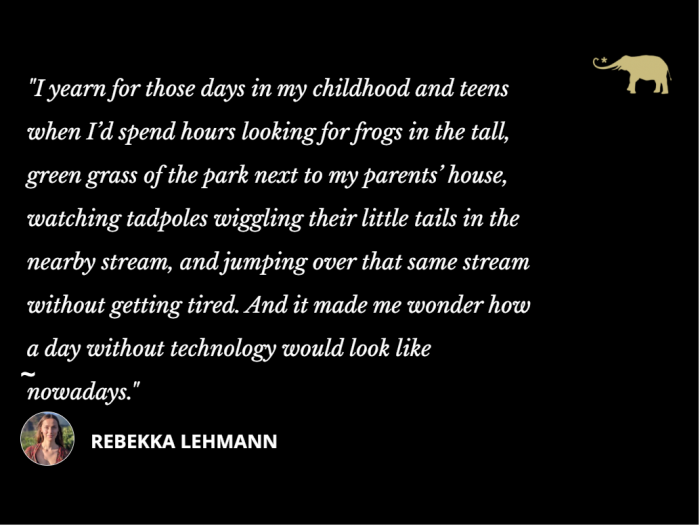View this post on Instagram
“Every day, consciously give yourself a moment wherein you are doing nothing—nothing but appreciating a beautiful view or favorite spot. Appreciate your life even momentarily, and the rest of our busyness will flower into well-being.” ~ Waylon Lewis
~
For the last six weeks, I spent almost every day at my laptop.
I work a lot to bring my vision to life. And since I was working on my website, it was a necessity to sit in front of the screen.
However, a few days ago, I noticed how much it tires me.
In the evening, I didn’t feel like watching my favorite series to turn off my brain or check my messages. I even started getting irritated when my partner was still at his laptop while I was trying to sleep.
I already have some boundaries in place when it comes to screen time. I use apps that take out the blue light and turn off all devices one and a half hours before going to bed.
But lately, these boundaries aren’t enough.
And it made me think about how much our lives have changed in the last 15 years, and what a big role technology has gotten—not only in our professional lives but our private ones, too.
I’ve personally experienced the incredible advantages that come with technology. I probably never would have been able to date my now-husband who’s from a different continent, nor could I stay in touch with my best friends who live in another European country.
And our current pandemic has, perhaps more so than ever, shown us how technology can be a tool to connect with others.
And still, I feel virtual fatigue.
I yearn for those days in my childhood and teens when I’d spend hours looking for frogs in the tall, green grass of the park next to my parents’ house, watching tadpoles wiggling their little tails in the nearby stream, and jumping over that same stream without getting tired.
And it made me wonder how a day without technology would look like nowadays.
So, last Sunday, I decided to try a screen-free day.
The idea was that for a whole day, I wouldn’t turn on my laptop or check my phone.
During this experiment, I’ve noticed that:
>> My body was exhausted
>> My brain wanted to keep busy and couldn’t calm down for the first half of the day
>> Whenever I remembered to do something, I was afraid to forget it, as I’m so used to the instant gratification of acting on my thoughts right away
>> Slowly, my mind started to feel more spacious again
>> After half a day, I felt my sense of creativity kick in
>> Instead of multitasking during everyday activities like cleaning and cooking, they became an informal mindfulness meditation
>> I truly enjoyed moments of boredom
>> Rather than time flying by, the day felt deliciously long
>> On Monday, I felt rested and recharged instead of craving another day of the weekend
Since in the past I had to learn the hard way how important it is to prioritize rest and recharge, I know that the only way to work sustainably is to integrate self-care into my everyday life.
If you also feel drained by constantly being in front of your computer or phone, I invite you to try this practice.
Here are some instructions to get you started:
1. Pick a day, half a day, or a few hours to dedicate to screen-free time during which you wouldn’t need your devices for work. Schedule it.
2. Ideally, check your calendar the day before to see if there are any things happening that you could need your phone for, like a birthday call you’d need to make.
3. Let any family members, who may get worried, know. Let your partner or roommate know in case you require or want their support on this. Together, decide how that could look like.
4. During the actual time, notice how your mind behaves. Are you trying to find excuses to use your phone, tablet, laptop, or TV? Write down any experiences you have in a journal or on a piece of paper.
5. Write down any device-related to-dos that come to mind for the next day instead of doing them right away, and notice how that feels like.
6. Notice how you are filling your time. Do you let yourself be bored, or are you trying to find things to do in the house to keep busy? How does it feel to let yourself be bored?
7. And, perhaps the most important step of all: if you do end up using a device, notice, are you judging yourself for it, or can you be compassionate, accepting where you’re at?
And if a day, half a day, or a few hours feel like too much, start with a moment.
I hope you enjoy this practice. May it be of benefit to you and everyone around you.
Do you have any screen time-related boundaries in your life? Share your experiences in the comments!












Read 6 comments and reply